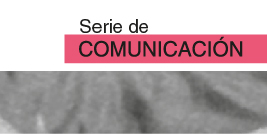Communication Series

1. Series Guidelines
This series belongs to the field of Communication Sciences. The scope of the series includes publications related to Audiovisual Communication, Cinema, Journalism and Advertising, with an open and diverse vision.
The object of the series is to foster reflection, the exchange of academic ideas and the generation of knowledge throughout the Scientific community.
2. Start data
Año 1993
3. Director
Imanol Zumalde Arregui
Professor of Audiovisual Communication at the University of the Basque Country (UPV/EHU) where he teaches subjects related to image analysis and film history. His works and publications reflect on the fundamentals of interpretation (especially images) and he has put into practice an analysis of the most diverse (audio)visual texts, materials on which he has published, among others, Los placeres de la vista. Mirar, escuchar, pensar (Ediciones de la Filmoteca, 2002), La materialidad de la forma fílmica. Crítica de la (sin)razón posestructuralista (Servicio Editorial de la Universidad del País Vasco, 2006), La experiencia fílmica. Cine, emoción y pensamiento (Cátedra, 2011), Formas de mirar(se). Diálogos sin palabras entre Chaplin y Tati, Lewis mediante (Biblioteca Nueva, 2013) and Fondo, figuras y paisaje. Cómo analizar imágenes y disfrutar en el intento (Fragua, 2021). He has also co-written with Santos Zunzunegui Ver para creer. Avatares de la verdad cinematográfica (Cátedra, 2019). He has four six-year research periods (last 2012-2017).
4. Scientific Committee
4.1. Members
- Santos Zunzunegui Diaz. Professor of Audiovisual Communication and Advertising. University of the Basque Country
- José Ignacio Armentia. Professor of Journalism. University of the Basque Country
- Carmen Arocena Badillos. Professor of Audiovisual Communication and Publicity. Universidad del País Vasco/Euskal Herriko Unibertsitatea
- Xoxe López García. Professor of Journalism. University of Santiago de Compostela USUC
- Carmen Rodriguez Wanguemert. Professor of Journalism, University of La Laguna
- Ainara Larrondo Ureta. Professor of Journalism, University of the Basque Country
4.2. Functions
The scientific committee is an advisory and consultancy body for the director of the series. One of its main duties is to ensure the scientific quality of the texts published. Other duties of the Committee also contribute to defining the collection's editorial policy, attracting original texts, proposing assessors and disseminating the collection.
5. Instructions for authors submitting original manuscripts
La persona autora remitirá a la Dirección del Servicio Editorial, el original definitivo de la obra y, junto a este, una solicitud debidamente cumplimentada en la que se especifique la siguiente información: datos personales, título completo de la obra (que puede modificarse en un futuro), interés científico, público objetivo y posible alcance comercial de la misma. También un breve currículo del autor.
Todos los trabajos serán inéditos o el resultado de una investigación original.
Los manuscritos deben abordar alguno de los ámbitos de investigación de la colección.
Los originales deberán ajustarse a la normativa incluida en el Anexo I del Manual de Publicaciones del Servicio Editorial de la UPV/EHU (4ª edición, diciembre de 2021).
6. Information on the manuscript selection process
The works must be original and have not been previously published in any other medium of communication.
The Editorial Committee will decide whether to publish it or not within a period not exceeding six months. In order to ensure its quality, the Scientific Committee will carry out an initial selection process and then the proposal will have to pass a double blind peer evaluation process.
If both reports are positive, the publication will be accepted, although changes may be suggested. In the case of disagreements, a third evaluation may be requested.
Once the evaluation process has been completed, the Series Editors will communicate by e-mail to the author, in the light of the aforementioned evaluations, the decision whether or not to accept the manuscript and, if accepted, any proposed corrections.
Should the work require corrections, these would be forwarded by e-mail to the Editorial Service Directors within a period of no more than 30 days from the date of receipt of notification of corrections. The author(s) will resend the revised manuscript, with the corrections clearly made and indicated.
